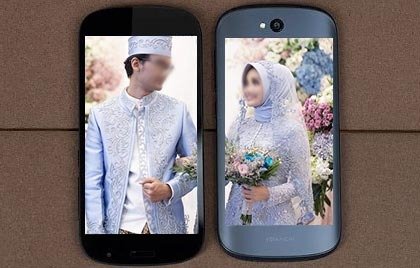The Role of Technology in Online Marriage Services
BLOG BY : Syed Ghouse Ahmed
In the fast-paced digital age of the 21st century, technology has revolutionized almost every aspect of our lives. One domain that this digital transformation has significantly impacted is the institution of marriage. Online marriage services, in particular, have emerged as a powerful tool for individuals seeking life partners. This article explores the multifaceted role of technology in online marriage services, delving into how it has transformed the way people find love, build relationships, and navigate the complex world of matrimony. Marriage, a cornerstone of human society for centuries, has traditionally been orchestrated through various cultural practices, family connections, and personal networks. While these methods continue to persist in many parts of the world, the digital revolution has given rise to a new avenue for seeking life partners – online marriage services. These platforms leverage technology to connect individuals with potential spouses, transcending geographical boundaries and social barriers.
Online Marriage Services Evolution
Online marriage services and roots can traced back to the early days of the Internet when matrimonial websites and forums began to emerge. However, these early platforms were rudimentary and primarily relied on basic profile creation and messaging features. Over time, technological advancements have transformed these services into sophisticated matchmaking platforms with a myriad of features and tools. Some key developments in the evolution of online marriage services include:

Advanced Algorithms and Compatibility Matching
One of the most significant contributions of technology to online marriage services is the development of advanced algorithms for compatibility matching. These algorithms analyze user profiles, preferences, and behaviors to suggest potential matches based on compatibility metrics. Machine learning and artificial intelligence have played a pivotal role in improving the accuracy of these recommendations.
Mobile Apps and Accessibility
The proliferation of smartphones and mobile apps has made online marriage services more accessible than ever. Users can now search for potential partners, communicate with them, and manage their profiles on the go. This increased accessibility has expanded the user base and diversified the demographics of those using online marriage services.

Enhanced Security and Privacy Measures
With the rise of online dating and marriage services, concerns about the security and privacy of users have become paramount. To address these concerns, platforms have implemented robust security measures such as identity verification, profile moderation, and data encryption. Technology has also enabled the reporting and blocking of abusive or inappropriate users.
Virtual Reality and Augmented Reality
Innovations in virtual reality (VR) and augmented reality (AR) have paved the way for immersive online dating experiences. Users can now participate in virtual dates, tour potential wedding venues in VR, or even attend online marriage counseling sessions using AR technology.
Video Chat and Communication Tools
The integration of video chat and communication tools within online marriage services has revolutionized the way users interact. These features enable real-time conversations, which can be crucial in building a connection before meeting in person. The COVID-19 pandemic further accelerated the adoption of video communication for virtual dating.
Online Marriage and The Impact of Technology on the User Experience
Technology has not only improved the functionality of online marriage services but has also significantly enhanced the overall user experience. Here are some key ways in which technology has impacted the user journey:
Efficiency and Convenience
Online marriage services offer a level of efficiency and convenience that traditional methods simply cannot match. Users can browse profiles, send messages, and receive responses within seconds, eliminating the need for time-consuming face-to-face meetings in the early stages of courtship.
Diverse User Base
Technology has enabled online marriage services to attract a diverse user base, transcending geographical, cultural, and religious boundaries. This diversity expands the pool of potential matches and increases the chances of finding a compatible partner.
Data-Driven Decision-Making
Data analytics and user insights have become integral to online marriage services. These platforms can track user behavior, preferences, and success rates to continually improve their algorithms and user experience. As a result, users receive more relevant match recommendations.
Personalization and Customization
Through technology, online marriage services can offer highly personalized experiences. Users can specify their preferences in great detail, from religious beliefs to lifestyle choices. The platform then tailors match suggestions accordingly.
Reduced Stigma
The anonymity offered by online platforms has helped reduce the social stigma associated with seeking a partner Online. This has encouraged more people, including those who may have been hesitant in the past, to explore online marriage services.
Online Marriage Challenges and Concerns
While technology has brought about numerous benefits to online marriage services, it has also introduced several challenges and concerns that need to be addressed:
Privacy Risks
The collection of personal data on online marriage platforms raises concerns about privacy and Data security. Users are often required to share sensitive information, and breaches can have serious consequences.
Scammers and Catfishing
Online marriage services are not immune to scammers and individuals with malicious intent. Catfishing, where someone pretends to be someone they’re not, can lead to emotional and financial harm.
Algorithmic Bias
Despite the advancements in Algorithms, there is a risk of algorithmic bias in matchmaking. If not properly designed and trained, these algorithms can reinforce societal biases related to race, religion, or other characteristics.
Overreliance on Technology
Some argue that online marriage services may lead to an overreliance on technology in the quest for love, potentially reducing the importance of real-world connections and social skills.
Cultural and Ethical Considerations
Online marriage services must navigate complex cultural and ethical considerations. They need to strike a balance between respecting cultural traditions and promoting individual choice and autonomy.
Online Marriage Future Trends and Possibilities
As technology continues to evolve, so too will online marriage services. Several intriguing trends and possibilities are on the horizon:
AI-Powered Relationship Counseling
Artificial intelligence could play a more prominent role in providing relationship advice and counseling. AI chatbots and virtual therapists could assist couples in navigating challenges and maintaining healthy relationships.
Virtual Reality Weddings
Virtual reality has the potential to redefine the concept of destination weddings. Couples separated by geographical distances could hold virtual reality weddings, allowing friends and family from around the world to attend virtually.

Blockchain for Verification
Blockchain technology could be used to enhance the verification process on online marriage platforms. This could increase trust and reduce the risk of fraud or misrepresentation.
Augmented Reality Date Nights
Augmented reality could take virtual dates to the next level by creating immersive experiences where users can interact in virtual environments or go on simulated adventures together.
AI-Enhanced Compatibility Testing
Artificial intelligence could be used to develop more comprehensive and accurate compatibility tests. These tests could consider a wider range of factors, from personality traits to long-term goals.
The role of technology in online marriage services cannot be understated. It has transformed the way individuals seek and find life partners, offering efficiency, convenience, and access to a diverse pool of potential matches. While there are challenges and concerns that need to be addressed, technology continues to drive innovation in this domain, with exciting possibilities for the future. As society continues to adapt to the digital age, online marriage services will likely play an increasingly significant role in the journey to finding love and building lasting relationships.
Online Marriage Accessibility and Reach Through Technology
The reach of online marriage services has expanded exponentially through technology. Users now have access to a vast pool of potential matches from around the world, breaking down barriers of distance and location. With just a few clicks, individuals can connect with like-minded people they may never have had the opportunity to meet otherwise.
Online Marriage and Efficient Matching Algorithms
Advanced algorithms powered by artificial intelligence and machine learning have greatly enhanced the efficiency of online matchmaking. These algorithms analyze vast amounts of data pertaining to user preferences, interests, backgrounds, and compatibility factors. By leveraging this technology, online marriage services can suggest highly compatible matches, saving users time and effort in their search for a life partner.
Online Marriage and Enhanced Communication Channels
Technology has revolutionized communication between individuals seeking a life partner. Online platforms offer various communication channels, such as instant messaging, video calls, and virtual meetings. These features allow users to connect and interact with potential matches in real time, fostering deeper connections and helping them get to know each other before committing to a face-to-face meeting.
Online Marriage Data Privacy and Security
Online marriage services invest heavily in ensuring the privacy and security of user data. Robust encryption protocols and stringent security measures are put in place to safeguard personal information. Users can trust that their details are kept confidential, providing a safe environment to share personal information and engage in conversations without fear of compromise.
Online Marriage and Comprehensive Profile Features
Online platforms provide users with the ability to create detailed profiles that showcase their personalities, interests, and values. Technology enables the inclusion of multimedia elements such as photos and videos, allowing users to present a more holistic view of themselves. This comprehensive profile information helps users make informed decisions when considering potential matches.
Online Marriage Verification and Trust Building
Technology plays a crucial role in establishing trust within the online marriage services community. Platforms often incorporate verification systems to authenticate user profiles, including identity verification, social media integration, and background checks. These measures help filter out fake profiles, providing a more trustworthy environment for individuals seeking a life partner.
Online Marriage Convenience and Time Efficiency
Online marriage services offer unparalleled convenience, allowing users to explore potential matches at their own pace and convenience. The availability of platforms on multiple devices, such as smartphones and tablets, ensures that users can access their accounts anytime, anywhere. This convenience saves time, particularly for individuals with busy schedules or those living in remote areas with limited access to traditional matchmaking resources.
In conclusion, technology has transformed the landscape of online marriage services by making them more accessible, efficient, and secure. It has revolutionized the way people search for and communicate with potential life partners, offering a platform that transcends geographical boundaries and connects individuals from diverse backgrounds. With technology as an enabler, online marriage services continue to shape and redefine the concept of marriage in our increasingly digital world.
Online Marriage and The Further Role of Technology
Technology has transformed every aspect of online marriage services, from the way people meet and interact to the algorithms that match potential partners. Here are several key areas where technology has played a pivotal role:
Matching Algorithms
Advanced algorithms and artificial intelligence (AI) are used to match individuals based on compatibility factors such as interests, values, and personality traits. These algorithms analyze vast datasets of user information to make more accurate and personalized suggestions.
Profile Creation
Users can create detailed profiles that include photos, personal information, and preferences. Technology enables individuals to curate their online personas, presenting themselves in the best possible light.
Communication Tools
Messaging systems and video calls facilitate communication between potential partners, allowing them to get to know each other before meeting in person. This technology has made it easier for people to establish connections with others, even across great distances.
Mobile Apps
The proliferation of smartphones and mobile apps has made online marriage services more accessible and convenient. Users can access these platforms from anywhere, increasing their chances of finding a suitable partner.
Data Analytics
Online marriage services collect a vast amount of user data, which is analyzed to improve the effectiveness of their platforms. This data-driven approach helps these services refine their algorithms and tailor user experiences.
Online Marriage Services and Benefits of Technology
The integration of technology into online marriage services has brought about several significant benefits:
Increased Accessibility
Technology has made it possible for individuals of all backgrounds, ages, and geographic locations to access online marriage services. This has expanded the pool of potential partners and increased the chances of finding a compatible match.
Efficiency
Online marriage services streamline the process of finding a partner by matching users based on compatibility factors. This efficiency saves users time and reduces the frustration often associated with traditional dating methods.
Diverse Options
Online platforms offer a diverse range of potential partners, allowing individuals to connect with people they might never have met otherwise. This diversity can lead to more enriching and diverse relationships.
Improved Safety Measures
Technology has enabled online marriage services to implement safety features, such as identity verification and reporting mechanisms for inappropriate behavior. These measures help protect users from scams and harassment.
Long-Distance Relationships
Technology has made it easier for individuals in different geographic locations to maintain long-distance relationships, fostering connections that may not have been possible in the past.
Data-Driven Matching
The use of data and algorithms enhances the accuracy of matching, increasing the likelihood of successful and compatible matches.
Challenges of Technology in Online Marriage Services
While technology has brought numerous advantages to online marriage services, it has also introduced several challenges:
Catfishing and Misrepresentation
Some users may create fake profiles or misrepresent themselves, leading to trust issues and potential disappointments for others.
Overreliance on Algorithms
Relying solely on algorithms for matchmaking may overlook important intangible factors that contribute to compatibility, such as chemistry and physical attraction.
Privacy Concerns
The collection and storage of personal data on online dating platforms raise concerns about privacy and data security.
Digital Fatigue
As technology reshapes the way people approach relationships and marriage through online platforms, a phenomenon known as “digital fatigue” has emerged. Digital fatigue refers to the weariness and exhaustion that individuals may experience when navigating the complexities of online dating and marriage services. While these platforms offer convenience and potential for connection, they also present unique challenges that can lead to this sense of exhaustion.
One aspect contributing to digital fatigue is the constant swiping, messaging, and evaluating of potential partners. The sheer volume of profiles and interactions can become overwhelming, leading to a sense of superficiality and emotional drain. Users may find themselves spending excessive amounts of time on these platforms, often with minimal meaningful results.
Moreover, the prevalence of misrepresentation and fake profiles can erode trust and exacerbate digital fatigue. The need to constantly discern between genuine connections and deceptive ones can be emotionally taxing.
Privacy concerns also contribute to digital fatigue. Users may worry about the collection and storage of their personal data on these platforms, leading to a sense of vulnerability and discomfort.
Addressing digital fatigue in the context of online marriage services requires platforms to consider user well-being and offer features that foster genuine connections while minimizing the negative aspects of digital dating. Additionally, individuals should be mindful of their online activity and take breaks when needed to maintain a healthy relationship with technology and, ultimately, with the pursuit of love and companionship in the digital age
Shallow Interactions
Technology can encourage superficial interactions and judgments based on appearance or profile information, potentially undermining the development of deeper connections.
Impact on Traditional Matchmaking
The rise of online marriage services has disrupted traditional matchmaking methods, raising questions about the future of culturally significant practices.
Online Marriage Implications for the Future
The role of technology in online marriage services has profound implications for the future of marriage and relationships:
Changing Norms and Expectations
Technology has influenced societal norms and expectations regarding relationships and marriage. The concept of finding love online has become widely accepted, reshaping how individuals view and approach marriage.
Shift in Dating Patterns
The prevalence of online dating has led to changes in dating patterns, including a focus on personal compatibility and shared interests rather than solely relying on familial or social connections.

Globalization of Relationships
Online marriage services have facilitated cross-cultural and international relationships, leading to a more globalized approach to marriage.
Redefining Commitment
The digital age has prompted discussions about the nature of commitment and the possibility of different relationship models, such as long-distance or non-traditional arrangements.
Challenges to Traditional Matchmaking
Traditional matchmaking practices are facing competition from online platforms, prompting adaptation or evolution of these practices.
Technology has played a pivotal role in the evolution of online marriage services, transforming the way individuals meet, connect, and form relationships. While it has brought numerous benefits, such as increased accessibility and efficiency, it has also introduced challenges, including issues of trust, privacy, and superficial interactions.
The future of marriage is undoubtedly intertwined with technology as online marriage services continue to shape societal norms and expectations. As technology continues to advance, the role of online marriage services will likely expand, offering new possibilities and challenges for individuals seeking love and companionship in the digital age. It is imperative that users, platform providers, and society as a whole address these challenges while embracing the opportunities that technology offers to redefine and enrich the institution of marriage.
Technology plays a pivotal role in online marriage services, revolutionizing how people find love and companionship. Advanced algorithms and artificial intelligence analyze vast datasets to match individuals based on compatibility factors. Communication tools like messaging and video calls facilitate connections, bridging geographical gaps. Mobile apps make these services accessible anytime, anywhere. Data analytics fine-tune user experiences, while safety measures protect against scams and harassment. While technology offers unprecedented efficiency and accessibility, it also raises concerns about privacy, misrepresentation, and shallow interactions. Nevertheless, it continues to redefine the landscape of modern relationships, shaping the future of marriage.
Related Links
- Court marriage Karachi Pakistan
- Court marriage Islamabad Rawalpindi
- Karachi court marriage services
- Islamabad court marriage procedure
- Rawalpindi court marriage lawyer
- Legal requirements for court marriage in Pakistan
- Court marriage documents in Islamabad
- Marriage registration in Rawalpindi
- Court marriage in Karachi cost
- Online court marriage services in Pakistan
